
 Eressos
Eressos
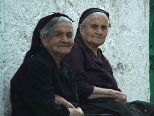 The wind begins blowing long before dawn, howling through the hills and banging the shutters. I'm too lazy to completely shut them and anyway it's too stuffy if I do. I have forgotten about the wind here and this surprises me because at times it can be such a constant companion in the Greek islands. I fall asleep and wake up twice. Both times I dream about the wind. In one I am in a blizzard, the other a hurricane. When I wake up it is still blowing and it's a beautiful sunny day. The priest is not home we are told by a woman at his house next to the church. He is at the cafeneon but we don't feel like checking each one to find which cafeneon she means. Instead we get in the car to drive to Erressos. There is an old woman dressed in black, sitting next to the enormous asphalt machine that has just finished paving the village entrance. We wave to her as we always do to everyone we see, but she does not acknowledge. Andrea aproaches to speak t
o her. She begins to cry. She is old. She cannot see. She wants to die, she tells Andrea.
The wind begins blowing long before dawn, howling through the hills and banging the shutters. I'm too lazy to completely shut them and anyway it's too stuffy if I do. I have forgotten about the wind here and this surprises me because at times it can be such a constant companion in the Greek islands. I fall asleep and wake up twice. Both times I dream about the wind. In one I am in a blizzard, the other a hurricane. When I wake up it is still blowing and it's a beautiful sunny day. The priest is not home we are told by a woman at his house next to the church. He is at the cafeneon but we don't feel like checking each one to find which cafeneon she means. Instead we get in the car to drive to Erressos. There is an old woman dressed in black, sitting next to the enormous asphalt machine that has just finished paving the village entrance. We wave to her as we always do to everyone we see, but she does not acknowledge. Andrea aproaches to speak t
o her. She begins to cry. She is old. She cannot see. She wants to die, she tells Andrea.
We leave Xidera behind and get on the road to Erressos, birthplace of the poetess, Sapho, and Mecca to Lesbisans of the world. We pass the village of Zithra which according to Pam is famous for being the village that all the prostitutes of Mytilini come from. I am eager to stop there, not for any sexual gratification but just out of curiosity. I would like to see what is different about this village that would cause it's women to leave and become hookers. Perhaps it is a tradition.
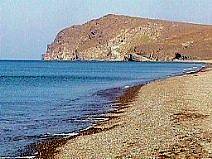 As we approach the western part of the island the land becomes noticibly less fertile. The mountains are quite barren and there are few fertile valleys until we reach Erressos which is as green as a place can be. There are two villages, one at the top of the valley, and one on the sea. We go first to the upper village and park in the platia. There is a cafeneon that advertises phonecards so I buy one to call my brother in America later. The ice-cream cooler has captured Amarandi's attention and we know that there is no way we can escape without buying her one. The proprietor has to search for the key. He appologizes for the lack of selection because it is so late in the season. Indeed it feels like fall. The sun has disappeared and we feel a few drops of rain. I make the mistake of asking him if any restaurants serve grilled sardines. He runs off to ask and comes back a few minutes later after speaking to someone in a restaurant the far side of the square. He points to it. "This is the best restaurant in Erre
ssos. He is a fisherman and guarantees that his fish are the freshest. But he has no sardelles." We promise to concider it and go to exlore the village. We pass a bacaliko, a type of tiny grocery store and who should come out but the man who was selling the house in Vatoussa. He greets us. He had said he owned a super-market in Erressos but I thought he meant something a little more dramatic. Sure enough though,there is a sign above the door that says Mini-Super-Market.
As we approach the western part of the island the land becomes noticibly less fertile. The mountains are quite barren and there are few fertile valleys until we reach Erressos which is as green as a place can be. There are two villages, one at the top of the valley, and one on the sea. We go first to the upper village and park in the platia. There is a cafeneon that advertises phonecards so I buy one to call my brother in America later. The ice-cream cooler has captured Amarandi's attention and we know that there is no way we can escape without buying her one. The proprietor has to search for the key. He appologizes for the lack of selection because it is so late in the season. Indeed it feels like fall. The sun has disappeared and we feel a few drops of rain. I make the mistake of asking him if any restaurants serve grilled sardines. He runs off to ask and comes back a few minutes later after speaking to someone in a restaurant the far side of the square. He points to it. "This is the best restaurant in Erre
ssos. He is a fisherman and guarantees that his fish are the freshest. But he has no sardelles." We promise to concider it and go to exlore the village. We pass a bacaliko, a type of tiny grocery store and who should come out but the man who was selling the house in Vatoussa. He greets us. He had said he owned a super-market in Erressos but I thought he meant something a little more dramatic. Sure enough though,there is a sign above the door that says Mini-Super-Market.
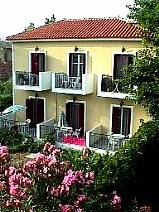
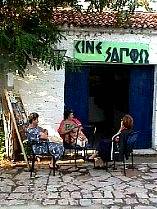 We wander the back streets. Andrea loves the village. The houses are old and well kept. There are few if any ruins near the center and the streets are paved with large stones. We circle the square and then return to it. I'd like to avoid the cafe owner so I don't have to explain that we are going to Skala Erressos and will not be eating at his friend's restaurant, but we are parked right in front of his shop.
We wander the back streets. Andrea loves the village. The houses are old and well kept. There are few if any ruins near the center and the streets are paved with large stones. We circle the square and then return to it. I'd like to avoid the cafe owner so I don't have to explain that we are going to Skala Erressos and will not be eating at his friend's restaurant, but we are parked right in front of his shop.
I notice him go out the side door and I seize the opportunity, hurrying my pace, jumping into the car, backing out with a squeeling of tires and picking up Andrea and Amarandi before they have gotten half way across the square.
The road to Skala is long and straight, with farms and old houses on either side. It ends a block before the sea where we park in a paved riverbed. The street along the beach is closed to cars. Instead there is a long walkway past cafe's and restaurants that stretch for about a quarter of a mile. It resembles a boardwalk of an American beach resort town. Many of the places are closed for the season and even those that are open have few customers because of the weather. The surf today is quite strong and the waves look inviting, but we are starving and I am irritable. We walk the length of the town checking likely restaurants but the only guy with sardines serves his baked with tomato sauce and we are looking for grilled. The very last restaurant is called Bennett's. It's owned by an English couple and is the least traditional but has an interesting menu so we abandon our search and settle for vegetarean mousaka, fried cheese wrapped in filo, and a salad. Amarandi is impossible, refusing to eat and demanding w
e take her to the toy train on the boardwalk. There are a few pale german tourists huddled beneath the awning but we sit out on a deck close to the raging sea. It's raining a bit but it doesn't really bother us. Mr. Bennett, who serves us is quite helpful and gives us lots of information on the village. There are about fifty foreigners who live here year round. Most of the tourists are German and Austrian. There used to be British but the tour group that sent them here went under. Supposedly a new company will recontinue the flow beginning next season. In the winter Skala is deserted. Everyone moves back to the upper village. The Bennetts have lived here for nine years. Many of the people who come to Skala Erressos are return visitors. They fall in love with the place and come back every chance they get, sometimes two or three times a season.
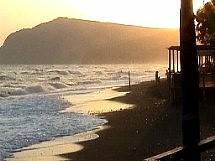 I want to do some body surfing. The waves are more then big enough but the sea floor is rocky and too painful so instead we buy newspapers and read them over coffees at one of the fancy cafes in the square. Amarandi fixates on another little kid and stares at her until they become friends. They run around the square until it's time for the little girl to leave and Amarandi becomes impossible again. We put her in a stroller and start walking towards the small fishing boat harbor at the end of the beach. On the way we meet a pretty blonde girl with a child of her own. Her name is Karen. She is a Norwegian-New Zealander married to a Greek from Erressos who owns a cafe-bar. While she and Andrea talk on the dock I go to investigate a small church in the trees overlooking a rocky beach. The waves are pounding the coast and the salty spray mixes with the rain. I feel alive. Above me on a mountain is the cave of Sapho, or so they say. There are ruins of a tower too but I don't feel like climbing up there. The girls h
ave returned to the village and I catch up with them at Karen's husband's cafe. By now it is pouring rain and people are running for cover. We spend the rest of the afternoon watching the rain fall and the waves break, until we decide to make the drive back to Xidera.
I want to do some body surfing. The waves are more then big enough but the sea floor is rocky and too painful so instead we buy newspapers and read them over coffees at one of the fancy cafes in the square. Amarandi fixates on another little kid and stares at her until they become friends. They run around the square until it's time for the little girl to leave and Amarandi becomes impossible again. We put her in a stroller and start walking towards the small fishing boat harbor at the end of the beach. On the way we meet a pretty blonde girl with a child of her own. Her name is Karen. She is a Norwegian-New Zealander married to a Greek from Erressos who owns a cafe-bar. While she and Andrea talk on the dock I go to investigate a small church in the trees overlooking a rocky beach. The waves are pounding the coast and the salty spray mixes with the rain. I feel alive. Above me on a mountain is the cave of Sapho, or so they say. There are ruins of a tower too but I don't feel like climbing up there. The girls h
ave returned to the village and I catch up with them at Karen's husband's cafe. By now it is pouring rain and people are running for cover. We spend the rest of the afternoon watching the rain fall and the waves break, until we decide to make the drive back to Xidera.
By the time we get to the platia in Xidera the wind is blowing and the rain is comming down so hard that the men have left their seats in the cafeneons to watch. Amarandi has fallen asleep in the car and rather then wake her and carry her to the house, we park next to one of the cafeneons and go inside, where we find Andrea's cousin Andrea, the retired taxi driver who happily buys us an ouzo. We are joined by the cafe owner who becomes interested in our conversation about exotic pepper plants and purple tomatos. He brings the big bottle of ouzo and keeps filling my glass. He wants us to bring him the seeds of purple tomatos, tomatillos and habenero's for his garden. The entire cafeneon is listening to our conversation. I tell them that where we live in America we go from our air-conditioned homes to our air-conditioned cars to our air-conditioned jobs and we are not outside for more then a few minutes at a time. They are astonished and comment excitedly to one another.
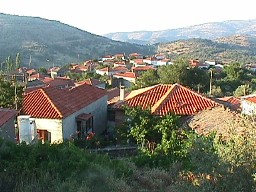 The priest runs across the wet platia and joins us at our table. He orders a cognac and lights up a cigarette. "Where were you?" he asks us. We tell him we had come by and he wasn't home. "I was at the cafeneon above", he explains and it is obvious that he has spent the entire day there. All the men are joking with him. He's the life of the party.
The priest runs across the wet platia and joins us at our table. He orders a cognac and lights up a cigarette. "Where were you?" he asks us. We tell him we had come by and he wasn't home. "I was at the cafeneon above", he explains and it is obvious that he has spent the entire day there. All the men are joking with him. He's the life of the party.
"Can you imagine going to him for spiritual advice?" Andrea asks me. Pam thinks he is the disgrace of the village but I disagree. He fits in perfectly. In a village where life revolves around ouzo and the cafeneons, how can you have a priest who doesn't drink? He's just like any of them only his job is being the priest. I make a mental note that one of these days I have to check out his Sunday service.